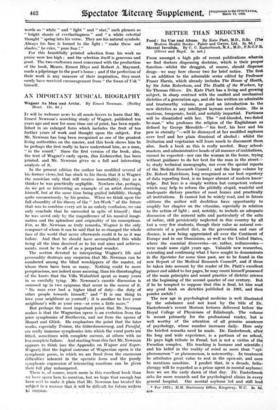AN IMPORTANT MUSICAL BIOGRAPHY
Wagner As Man and Artist. By Ernest Newman. (Bodley Head. 12s. 6d.) IT will be welcome news to all music-lovers to learn that Mr. Ernest Newman's searching study of Wagner, published ten years ago and now for some time out of print, has been repub- lished in an enlarged form which includes the fruit of ten further years of work and thought upon the subject.- For Mr. Newman has long been recognized as one of the greatest living authorities on the master, and this book shows him to be perhaps the first really to have understood him, as a man, " in the round." Since the first version of the book, also, the text of Wagner's early opera, Das Liebesverbot, has been printed, and Mr. Newman gives us a full and interesting analysis of it.
In the present edition the author has modified several of his former views, but has stuck to his thesis that it is Wagner the musician only that will receive immortality, that as a thinker he was practically negligible. Nowhere else, perhaps, do we get so -interesting an example of an artist deceiving hithself, but at the same time being guided infallibly, though quite unconsciously, by his genius. When we-think upon the full absurdity of his theory of the " Art-Work " of the future that was to combine every art in an unholy confusion, we can only conclude that he succeeded in spite of himself ; that he was saved only by the magnificence of his musical imagi- nation and the splendour and originality of his conceptions. For, as Mr. Newman so truly remarks, Wagner is the only composer of whom it can be said that he so changed the whole face of the world that never afterwards could it be as it was before. And that he should have accomplished this while being all the time deceived as to his real aims and achieve- ments, must be to all of us a perpetual wonder.
The section devoted to interpreting Wagner's life and personality destroys any suspicion that Mr. Newman can be numbered among the blind worshippers of the master, of whom there have been so many. Nothing could be more perspicacious, nor indeed more amusing, than his disentafigling of the knots that the Villa Wahnfried spent so many years in .so carefully tying. Mr. Newman's caustic discussion is summed up in two epigrams that occur in the course of it. " No man ever had a higher ideal of duty—the duty of other people towards himself," and " It is one thing to love your neighbour as yourself ; it is another to love your neighbour's wife as your own—or even a little more."
But perhaps the most important point that Mr. Newman makes is that the Wagnerian opera is an evolution from the later symphonies of Beethoven, and not from the operas of Mozart and Gluck. He emphasizes the point that the later works, especially Tristan, the Gotterdammerung, and Parsifal., are really immense symphonies into which the vocal parts are fitted, sometimes with complete success, at others with no lesi complete failure. And starting from this fact Mr. Newman appears -to think (see the Appendix on Wagner and Super- Wagner) that the logical outcome of Wagnerian opera is the symphonic poem, in which we are freed from the enormous difficulties inherent in the operatic form and the purely symphonic expression of interacting emotions can be given their full play unhampered.
There is, of course,-much more in this excellent book' than we have space here to mention, but we hope that enough has been said to make it plain that Mr. Newman has treated his subject in a manner that it will be difficult for future writers to chrpii.ss.






























































 Previous page
Previous page